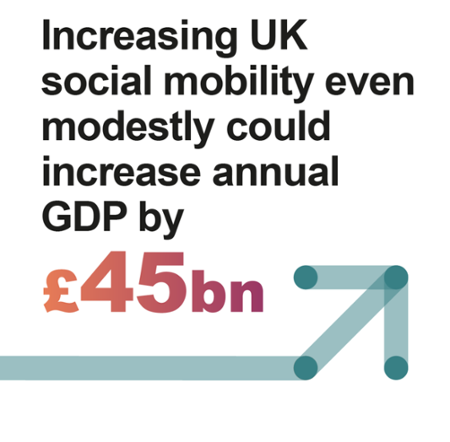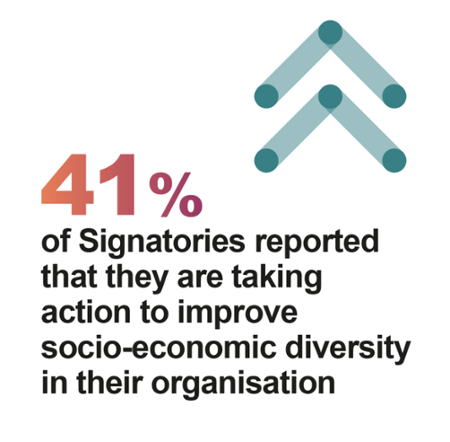Diversity in Tech 2024 Report > The Sutton Trust
The Sutton Trust is tackling social mobility with a new 'Tech Task Force'
The Sutton Trust are setting up a Tech Task Force on Social Mobility. This will be a collective of organisations driving industry change together. They want you to be a part of it! Find out more about the task force and how you can participate below.
Socio-economic diversity helps solve the tech skills shortage
Last year we reported that only 38% of companies were measuring socio-economic background, and disappointingly, that number remains totally unchanged this year. In fact, 47% of companies expressed outright that they were not focusing on this area of D&I. Therefore it’s not surprising that tech employers appear to be doing a very poor job at engaging talent from a wide variety of socio-economic backgrounds.


Low social mobility comes at a high cost to the UK
Research by Oxera and The Times Education Commission found that increasing UK social mobility even modestly could increase annual GDP by £45bn. When you layer this on top of the tech talent shortage, tapping into underemployed populations in social mobility cold spots is an obvious win for delivering economic and social value. Thanks to the prevalence of flexible working in tech, nearly half of tech jobs can be done from any location. Remote tech jobs help to stem so-called “brain drain”, where skilled workers migrate to tech centres for work, impoverishing regional economies and communities. The sheer demand for tech workers makes the tech economy a great vehicle for social mobility, because if you’ve got the skills, there are tech jobs out there for you that can pay 64% higher than the average UK salary.
We need to do more to improve socio-economic diversity in tech
The only saving grace is that whilst the majority of companies might not be doing well at measuring socio-economic background, more of them are taking the route of action first, data later. 41% of Signatories reported that they are taking action to improve socio-economic diversity in their organisation, compared to the 35% who are measuring it. Overall, 53% of companies are either measuring socio-economic diversity, taking action on it, or doing both (23%).

The Sutton Trust are setting out to solve the social mobility problem in tech
Tech Talent Charter Signatory, the Sutton Trust, are setting out to solve social mobility in tech. Here's what they said about their new Tech Task Force:
"The Sutton Trust has more than 25 years of experience tackling social mobility and increasing education and employment opportunities for young people in the UK. Our work has spanned law, finance, medicine and many other hard to access careers. We see huge opportunities in tech – a growing and well-paid industry with a significant skills shortage.
To make real change, close the social mobility gap and address the skills shortage in tech, the tech industry needs to take action. There is a lot of passion and dedication to make tech a fairer and more diverse sector and The Sutton Trust wants to harness that energy to make lasting change.
We want to set up a Tech Task Force on Social Mobility – a collective of organisations driving industry change, and we want you to be a part of it! The group would bring together those collecting data, those taking action and anyone not on their journey yet, to learn from one another and embed good practice across the sector.
Tech Talent Charter’s data shows us that pockets of work are already happening, but we want this to go further. We want to work with you to make tech an exciting career option for everyone, regardless of background.
What we need is industry buy-in, dedication and engagement, and, of course, to cover the costs. Securing sufficient commitment across the tech sector is our first priority towards this task force."

Creating a Tech Task Force on Social Mobility
How it will work
The Tech Talent Charter’s data shows us that pockets of work are already happening, this task force will provide a space for organisations to share knowledge and best practice, learn from each other and the Sutton Trust. We will look at everything that can impact social mobility; from collecting data to interview practices to attracting diverse talent – nothing will be off the table.
This will not be a talking shop; we want to work with organisations willing to take action and make change.
Expectations
- Members will commit to a number of key priorities, agreed to by the group but likely to be based around the areas of focus listed below.
- Members will pay into a central pot to cover programme costs – this will be tiered to account for the size of your organisation.
- To treat this as a whole sector initiative – change in the industry is good for everyone.
How to drive change
There are many ways of improving socio-economic diversity in tech and we want to start conversations that look at, but are not limited to, the following areas:
Data collection and analysis
Having a clear idea of where we are is the first important step: understanding your current workforce, where they came from, and how they are progressing. This information allows you to better understand where in the pipeline you are losing talent.
Young person engagement
Young people do not know enough about the jobs available in tech, or the potential earning possibilities. In 2020, Sutton Trust research showed that misconceptions and stereotypes were a significant contributor to unequal access to tech careers.
Work experience and internships
Good quality work experience placements that remove barriers for entry will go a long way in bringing diverse talent into the tech industry. This will support people without an existing network in the industry to gain vital experience.
Practices, policies and procedures
Reflect on internal policies and procedures that could be creating barriers. Could the way you recruit be putting off people from low-income backgrounds? How are you retaining and developing diverse talent and making it a supportive work environment?
Social mobility benefits the tech sector
Closing the social mobility gap in tech is a win-win, more talent to fill an ever-growing need for skilled professionals and increased opportunities for people currently overlooked.